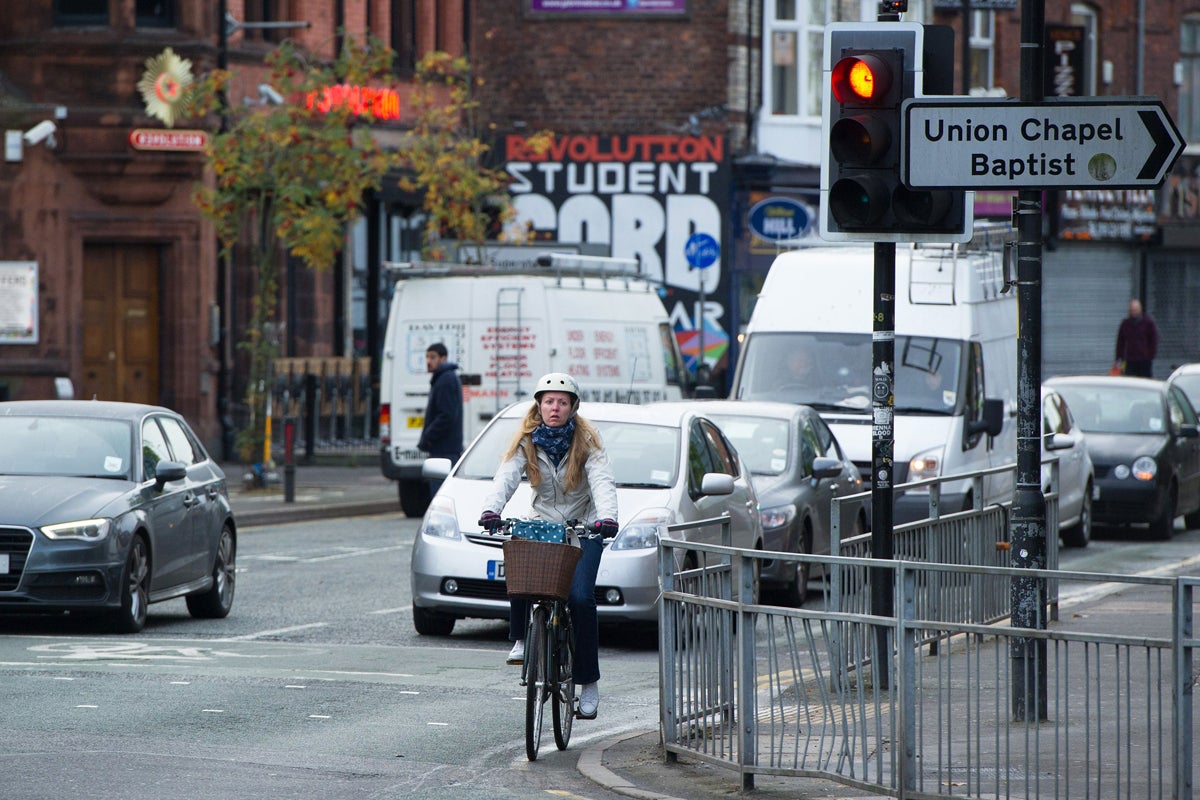‘A disaster from start to finish’: Exasperation reigns in England’s new coronavirus capital
Colin Drury speaks to residents of Fallowfield in Manchester, the worst-hit area in country after arrival of thousands of students


Sheila Harrison is awaiting her monthly beauty treatment at Hair Fairy Boutique in Fallowfield, Manchester, when The Independent tells the 76-year-old that this, her home neighbourhood, is now England’s coronavirus capital.
“Bloody students!” exclaims the grandmother-of-two. “Send ‘em home. Bringing us a pandemic. They should never have been allowed to bloody come. It’s a disaster from start to finish.”
She considers for a moment.
“I warned you, love,” the retired cleaner smiles. “I warned you if you got me talking about this I’d turn the air blue.”
On Tuesday afternoon, here in this south Manchester suburb – home to a sprawling 4,000-student University of Manchester campus – she was not alone in her exasperation.
News that this city is now, in spite of two months of enhanced restrictions, suffering the worst Covid-19 infection rates in the UK – 551.9 cases per 100,000 people as of Tuesday evening – has caused no small amount of frustration here.
The fact that much of this contagion is centred around the relatively small neighbourhood of Fallowfield – population 15,000 – has, meanwhile, led to the paradox of residents being both shocked but not really surprised.
No-one here blames students - not even Mrs Harrison when we get down to it - but there is much chagrin that the government and universities seem to have been so ill-prepared for the potential consequences of what is essentially a mass migration during a deadly pandemic.
“What did they expect?” asks Clare Taylor, owner of said boutique. “You get thousands of people from across the country coming to live in one place in shared flats? I’m no scientist but that sounds like just the way you’d spread a virus to me.”
That the arrival of some 80,000 students appears to have caused Manchester’s – and Fallowfield’s – sudden Covid surge, there is no doubt.
Fifty-five per cent of all cases identified here over the last seven days have been people aged 17-21. “I haven’t got the exact calculations for [the infection rate of] that age group,” David Regan, the city’s director of public health, tells The Independent, “but it’s now somewhere above 3,000 per 100,000. It’s a lot.”
At least 1,041 University of Manchester students have tested positive. Those figures themselves follow an outbreak at Manchester Metropolitan Uni where 531 positive cases were identified in the first two weeks of term alone
So bad is the situation that both centres announced on Tuesday afternoon that they were suspending almost all face to face teaching in favour of online lectures and seminars until at least the end of the month.
It is not an issue unique to Manchester, either. University towns across the country – including Sheffield, Durham, Liverpool and Newcastle – have seen similar infection surges since the new academic year began.
Yet, here in Fallowfield that only adds to that sense of chagrin.
“This challenge was entirely predictable and predicted,” says Afzal Khan, MP for Manchester Gorton which includes this patch. “It was an act of shocking complacency that the government failed to ensure test and trace was fully operational before encouraging students to travel the country and start adult lives.”
The silver lining, he points out, is that, as yet, the spread does not appear to have crossed over into the local community or into older age groups. Manchester’s hospitals remain relatively untroubled at present.
“But students don’t live in isolation,” the Labour politician points out. “They go to the same shops and use the same public transport as the rest of us.”
The concerns are particularly acute because Fallowfield, with a non-English population of almost 30 per cent, is just the sort of ethnically diverse area that coronavirus hit especially hard in the spring. Eighteen people here died up to June – the worst such figures in Manchester.
Mohammed Chaudhry feared he, or his loved ones, were going to be among them. The 64-year-old taxi driver caught the bug in March and spent 10 days gasping for breath. Two of his four adult children were hospitalised.
“It was chaos there,” he says. “This was April. The wards were full. The doctors and nurses were doing their best but they were too busy. I’ve never been so scared. You know, we thought we might lose them.”
He mentions a second lockdown. Would he support one? “It shouldn’t have got to this,” he says. “But I’ve seen what this virus does. Yes, I would.”
What’s striking, however, is that he may be in the minority. Few people who The Independent speaks to this week want more restrictions.
“My feeling is there’s no appetite for that,” agrees Jade Mary Doswell, a Manchester City Council member for the ward. “People have had to live without proper contact with loved ones for too long. They understand the risks but they want to get back to some normality.”
Can that be done with a vast student campus bang on the door step, one wonders? Yes, she says. The transmission is not yet in the wider community: “All our efforts must now be focused on keeping it that way.”
At Fallowfield Campus itself – “the epicentre of the epicentre” as one student puts it – a gallows humour pervades.
“I thought I might catch it at some point when I moved up here,” notes 18-year-old nursing student Katie Brameld. “I didn’t think it would be in the first week, though.”
Her flatmate Izzy Bye comes from Dorset. “I went from knowing literally no one who’d had it to not being able to speak to someone without finding out they’ve tested positive.”
But neither regret not deferring a year as a result of what is happening. “Got to crack on with it, haven’t you?” says Izzy.
In the windows of flats here, the age-old freshers’ tradition of writing signs in windows has taken on a coronavirus-twist.
“Flat self-isolating,” it says in several of them, followed by a countdown of how many days they have left until freedom. Others are simpler: “send food,” reads one. “Send cock,” adds another. Well, whatever takes your fancy.
“Obviously, it’s not exactly the first year anyone dreamed of,” says Drew Thornley, a fresher studying cell biology. “But I think most people are just trying to make the most of it.”
His own flat has just finished two weeks in isolation. “It was fine,” the 19-year-old from Glossop says. “Only one of us caught it and they were okay. We all get on really well so we did a lot of drinking, getting to know each other. If you didn’t get on with your flatmates, I can imagine that would be pretty difficult but I quite enjoyed it. Story to tell.”
Perhaps, he adds, it is better that the virus is ripping through the campus: “At least it’s all young people here – no one is taking it back home to parents or grandparents.”
His friend Emma Bate, a psychology student from Cornwall, mentions the government’s 10pm curfew. “Awful,” she says. “When you went to a club, they make you sit down so you’re naturally socially distancing but now, people get back to halls early and have massive parties. And I’ve got to say there isn’t much social distancing going on there.”
A quick disclaimer: “I haven’t been to any, obviously.”
There is some annoyance here that classes have now been made online only but even that seems to come with some acceptance that such temporary measures will probably be needed for a period of time.
Ultimately, if there is exasperation in the wider community, optimism appears to reign on campus. Yet both have one thing in common: a sense of uncertainty hanging in the air.
Somehow Ms Harrison’s words in that beauty salon once again seem fitting: “I don’t know what’s going to happen,” she noted, “the trouble is, I don’t think neither do them in charge.”
Join our commenting forum
Join thought-provoking conversations, follow other Independent readers and see their replies
Comments

Bookmark popover
Removed from bookmarks